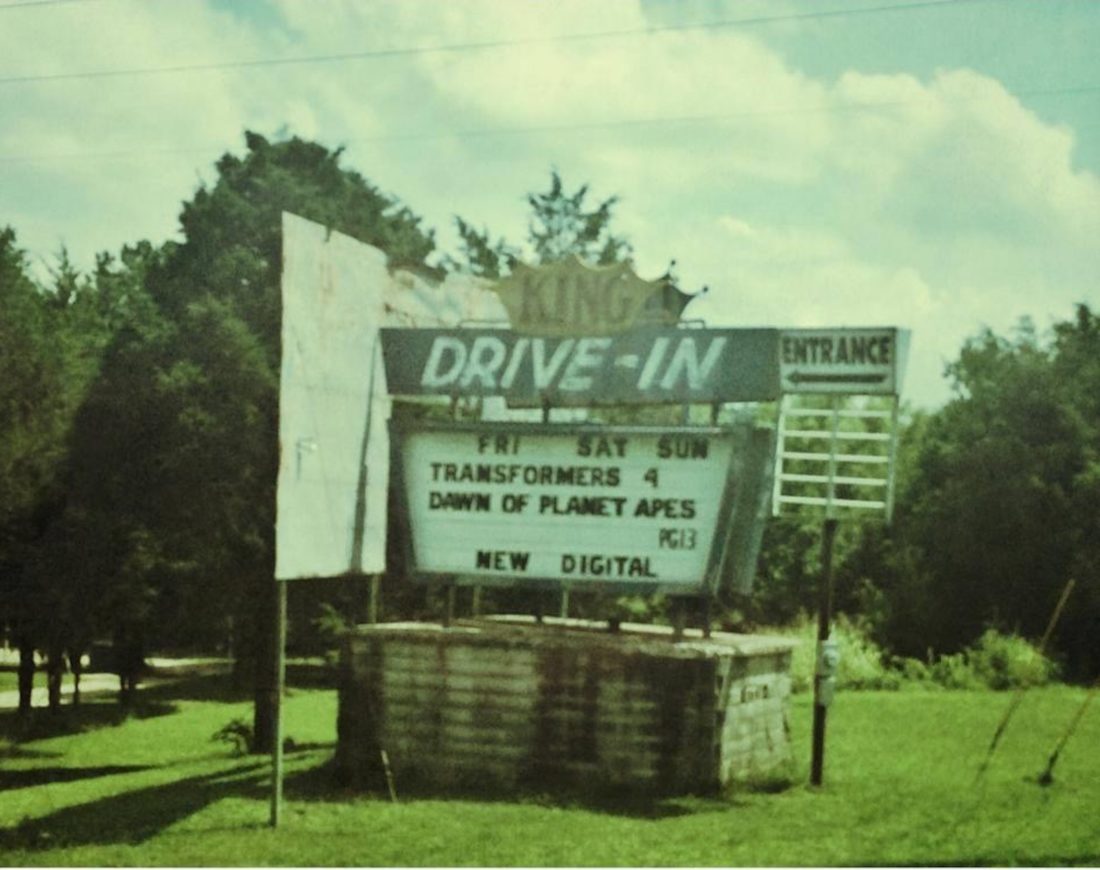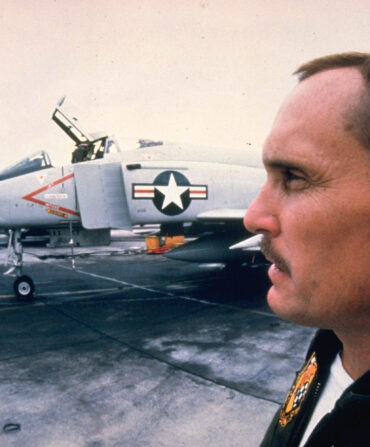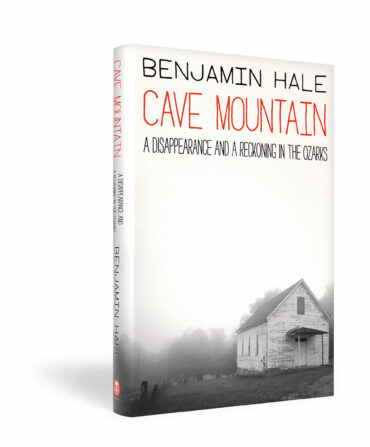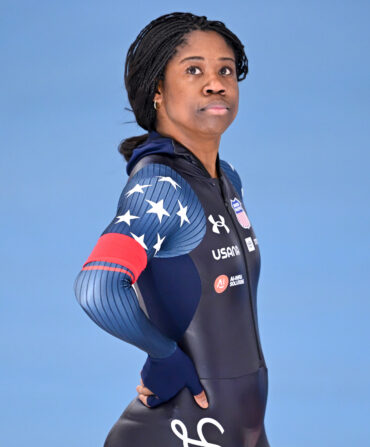Every Saturday evening without fail since the pandemic hit, I’ve poured myself a hefty cocktail—mostly Four Roses in an old coffee mug—and hopped on video chat to talk movies for an hour with some of my closest friends. The conversation careens from the great pre-code films of the early thirties to the French New Wave and all the way up to action movies of the eighties. One evening delved into the parallels of 1986’s Crocodile Dundee and 1934’s It Happened One Night. No film is too high-brow or too low-brow to escape our bourbon-fueled analysis and pronouncements. Nicolas Cage is great. Sure. The director Tony Scott is underrated. OK, I’m coming around to the idea. The Spike Lee oeuvre needs revisiting. Agreed.
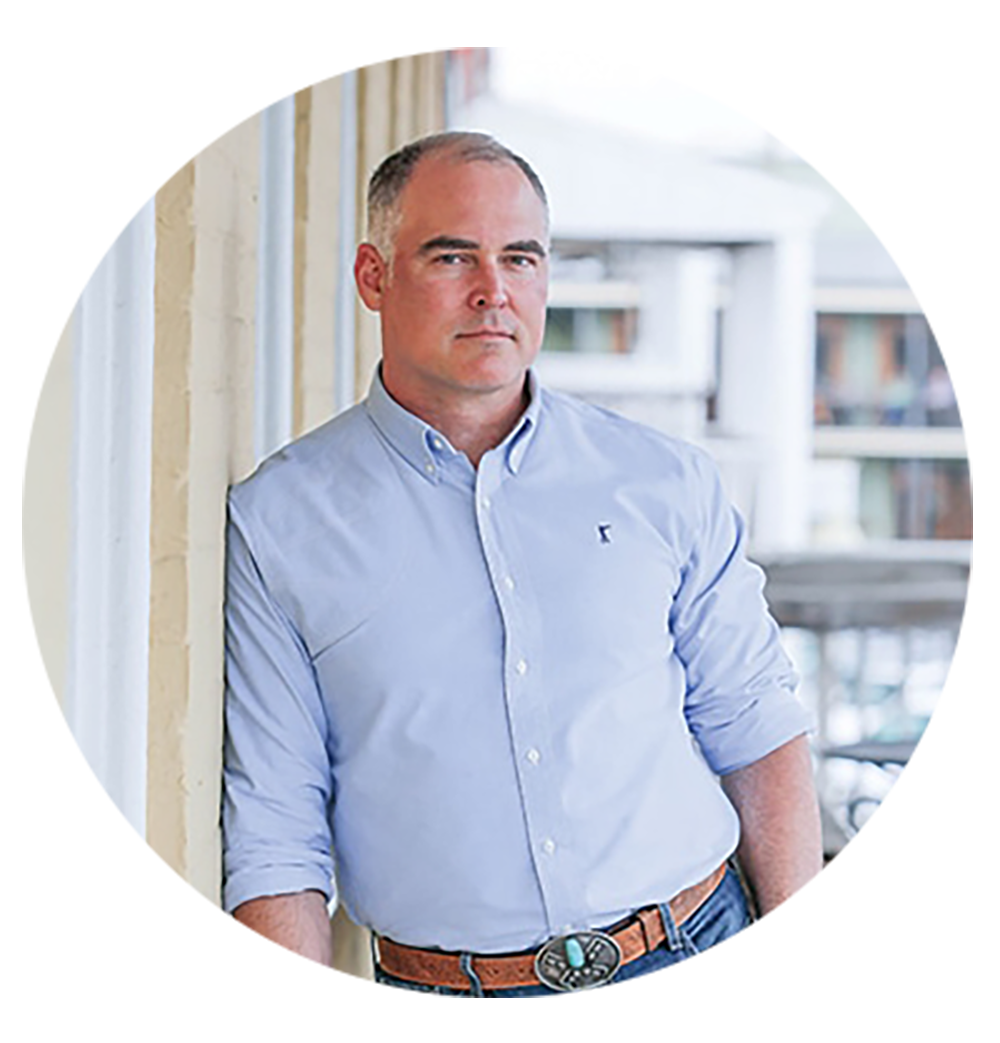
The only rule of the Saturday night meet is that we don’t discuss the pandemic or politics. Saturday night Zoom is sacred space to talk about what we love most about the movies. It’s our space to escape for a little while. (Although a recent discussion veered into racism in Hollywood, with two of our members having just returned from protests in New York City.)
Since both my local movie theaters here in Oxford, Mississippi, have shut down, this lively weekly discussion is about as close as I can get to the movie-house experience. I miss getting together with friends or complete strangers to watch the latest releases or old classics. All people, all walks of life, sharing an experience in the dark.
We don’t really know if, when, or for how long the movie houses might open—or if people would risk sitting in them if they did. A few theater chains have tested re-openings in some markets. To be honest, as much as I love going to the movies, I’m not ready to gamble with my health. But there’s hope, fellow movie lovers. A smattering of drive-ins, both old-school and pop-up, are lighting up the South, a beacon during the wild ride of these last few months.
An hour north of my home in Oxford, the historic Summer Drive-In is back in business after all movie theaters in Memphis closed in March. Malco Theaters, which owns the Summer, got a thumbs up from Shelby County to re-open the drive-in in May.
“It’s emotional to be down,” said Karen Melton, vice president and marketing director for Malco. “And it’s emotional to come back up. We want to do nothing more than show movies and bring the love of cinema back to where it belongs.”
Recently, the Summer showed newer releases like The Invisible Man and The Hunt along with classics like Jurassic Park and Jaws. The drive-in has been sacred movie territory in the South since 1948 when it debuted to Yvonne DeCarlo in River Lady. (A Technicolor Western I’ll be adding to our movie group list.) “There’s something magical about the light flashing onto the big screen, the sound kicking in,” Melton said. “You’re able to forget about life for a couple hours. I think people miss that escapism.”
I remember my first visit to a drive-in, back in the summer of ’86, in Alexander City, Alabama. The movie, Back to School with Rodney Dangerfield, was pretty terrible, but that didn’t matter. I sat in the humid night, lightning bugs flickering in the shadows, with two of my cousins at the same theater my mom frequented as a teenager in the 1950s. The lot was weedy, the screen was cracked, and the projector sometimes fluttered. But I had private seating, fresh air, and concessions were only a short walk away. Dangerfield never got more respect performing the Triple Lindy off the high dive.
That old Alexander City drive-in didn’t last long after that night in 1986, along with most drive-in theaters in America, especially those that once operated in the 1950s. In the fifties and sixties, there were slightly more than 5,000 drive-ins in the United States, according to Jim Kopp, administrative secretary for the United Drive-In Theater Owners Association. Now there are only 305.
In Russellville, Alabama, the 71-year-old King Drive-In has never missed a night—and that includes during the pandemic. Greg Greenhill, who co-owns the theater with his dad, Jimmy, said he’s seen sold out crowds at his theater off Highway 43, an hour and twenty minutes east of Huntsville and not far from Muscle Shoals. The marquee is pretty epic Americana, painted a faded blue and topped with a yellow neon crown.
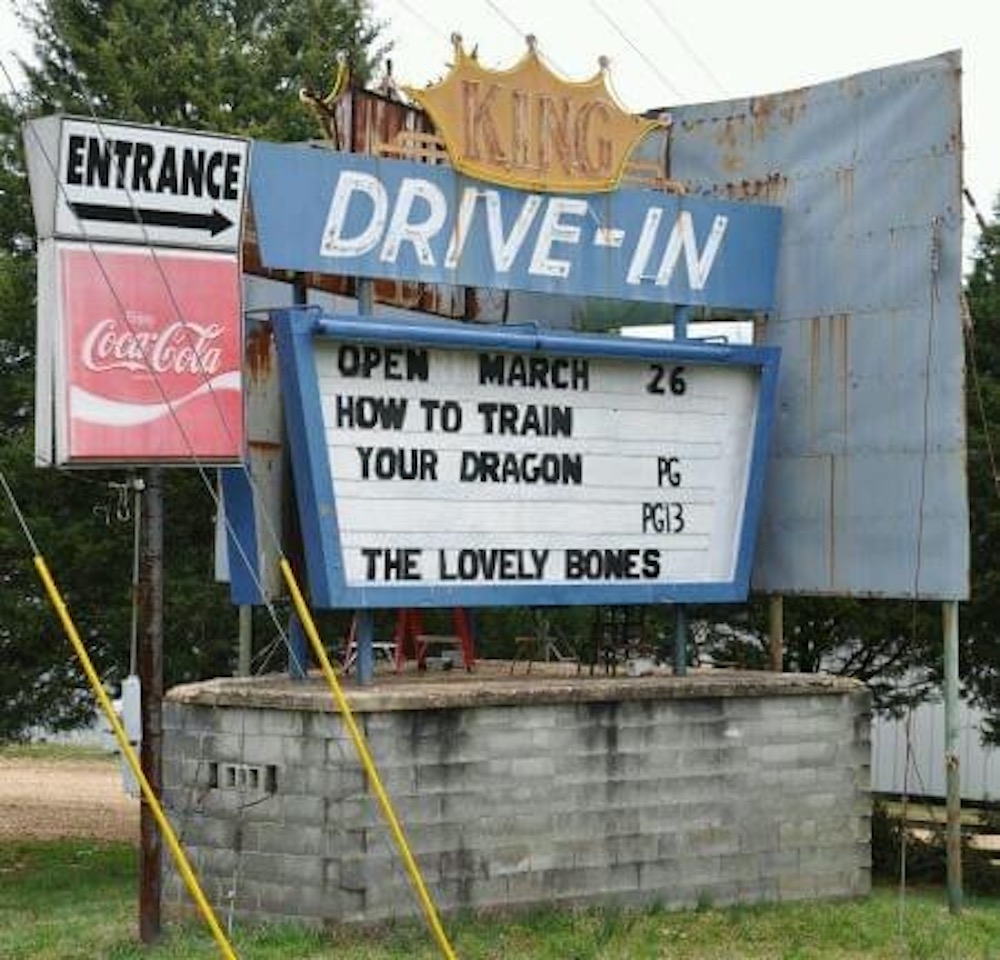
As a kid in the seventies and eighties, Greenhill watched the whole town turn up at the drive-in to see Burt Reynolds race across Georgia in Smokey and the Bandit and Sissy Spacek sing that she was proud to be a Coal Miner’s Daughter. The King stayed relevant in Russellville at a time when people in bigger cities demanded Dolby Atmos sound and leather recliners. Two summers ago, Greenhill said a family pulled into the theater lot in a big dualie pickup truck, the bed filled with water, floats, and beach balls. The family relaxed in their pickup pool to watch the killer shark movie The Meg.
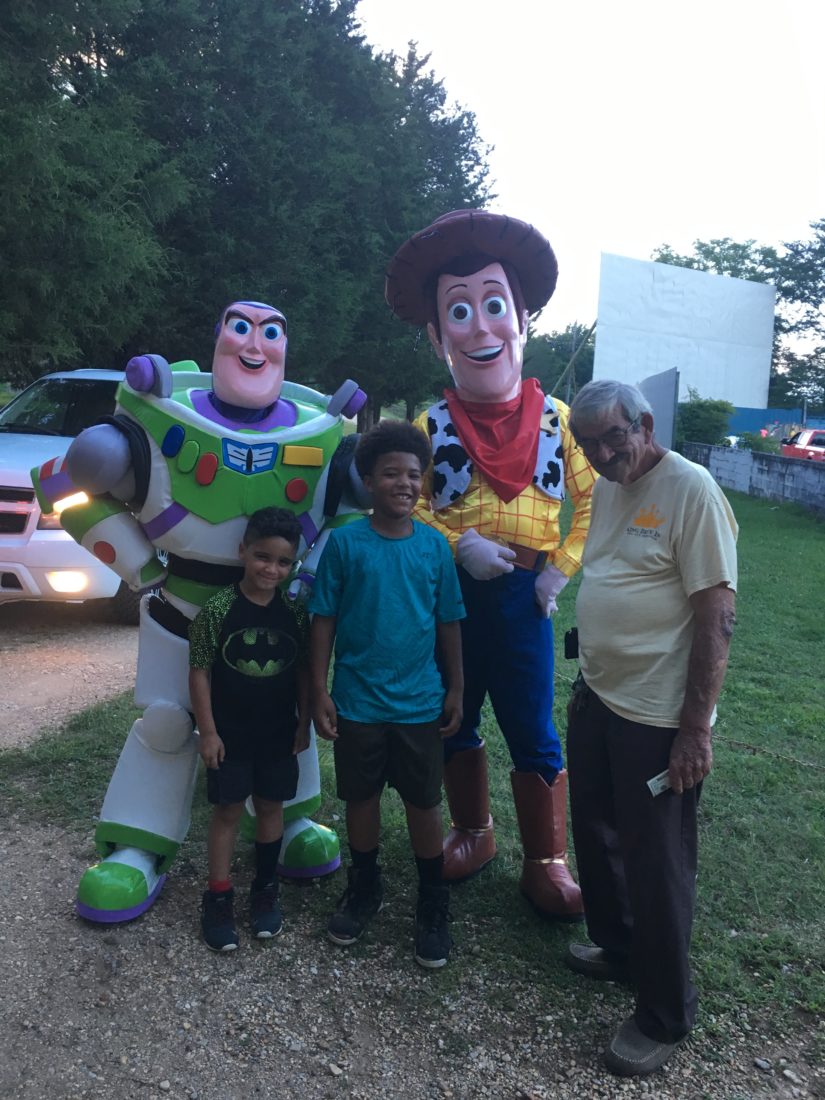
When all those recliner-outfitted megaplexes closed in March, Greenhill increased the spaces between cars at the King, changed the bathroom policy to discourage crowding, and stayed open. He said he’s received a ton of emails, texts, and Facebook messages from folks in the town thanking him. They told him they needed a movie theater.
In Atlanta, the Plaza Theatre has been showing movies since opening its doors to The Women, starring Joan Crawford and Norma Shearer, in 1939. By the 1970s, the Art Deco theater had fallen on hard times and had to turn to X-rated flicks to keep the rent paid. But the Plaza has since been restored to its old glory, now the vibrant heart of the Atlanta film scene and consistently ranked as one of the best movie theaters in America. Though it, too, has been closed since March, in May, owner Chris Escobar transformed the theater’s parking lot into a pop-up drive-in. The first outdoor showing in the Plaza’s 81-year history was Back to the Future.
“I think it brings back a little bit of a sense of normalcy,” said Escobar, also the executive director of the Atlanta Film Society. “I don’t have to make a ton of money. But if I can at least keep my folks working and give people an excuse to get out of the house, then great. As we figure this out, we’re looking to scale it up. Add locations. Add more days.”
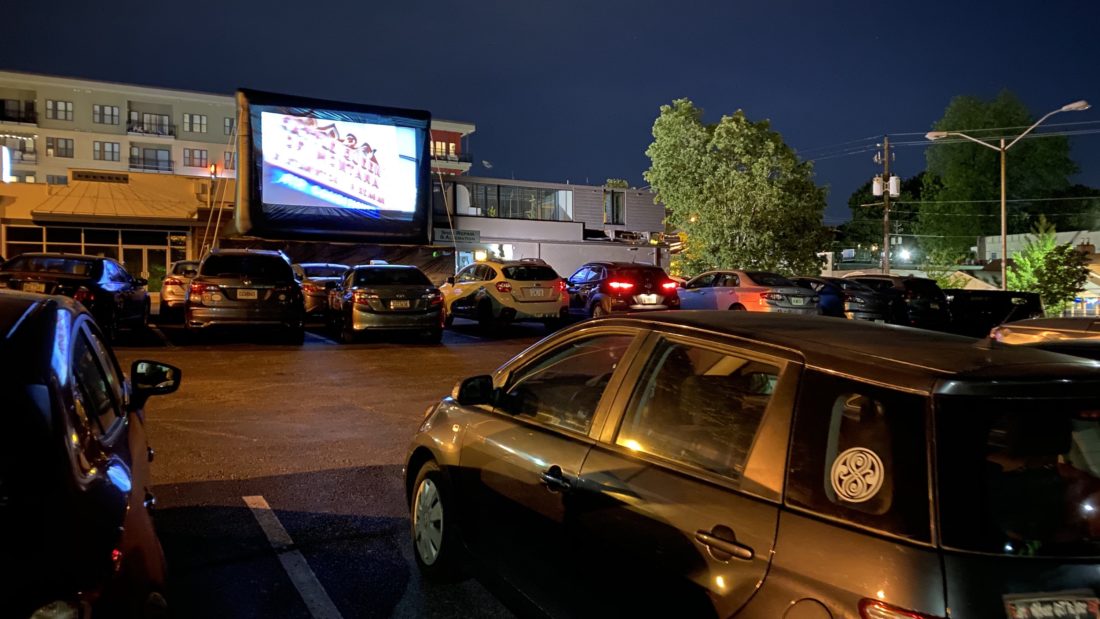
Beyond concessions, Plaza Drive-In moviegoers order takeout from some of the neighborhood’s best restaurants, who will deliver right to your car. Sure, you could just as easily get takeout and watch a movie on your TV at home, but where’s the joy in that? Movies are like Norma Desmond in Sunset Boulevard: “I am big. It’s the pictures that got small.”
Since their invention films were made to be seen on a big screen in the company of others. Not by yourself on your laptop or iPad. It’s a shared experience even more intimate and often more moving than attending an SEC football game. Not to be blasphemous, but theaters, outside or in, are sacred places where all types of people gather in the dark to share in adventures, romances, or laugh at comedies.
The other day I was driving in my truck to where I work in the Oxford town square. The guest on NPR that afternoon was Michael Osterholm, director of the Center for Infectious Disease Research and Policy at the University of Minnesota. Osterholm was talking about how much he hated the phrase “social distancing.” He preferred “physical distancing,” because now more than ever humans need to feel they are part of the community.
I couldn’t agree more. And as many bars, restaurants, and shops remain closed or are operating under strict policies, drive-ins may be a bright light in the dark for the summer of 2020. As a virus and embers of hate try to divide us during this season, I hope the flickering neon and projected images and stories can give us a little oasis to rest, catch our breath, and dream of what’s coming on that next reel.
Ace Atkins is the New York Times bestselling author of twenty-five novels. The former newspaper reporter and SEC football player lives in Oxford, Mississippi, with his family, where he’s friend to many dogs and several bartenders. His latest, The Revelators, will be out July 14 from G.P. Putnam’s.
Ace Atkins is an award-winning, New York Times best-selling author who started his writing career as a crime beat reporter in Florida. Don’t Let the Devil Ride is his thirtieth novel. His previous novels include eleven books in the Quinn Colson series and multiple true-crime novels based on infamous crooks and killers. He lives in Oxford, Mississippi, with his family.
Garden & Gun has an affiliate partnership with Bookshop.org and may receive a portion of sales when a reader clicks to buy a book. All books are independently selected by the G&G editorial team.


